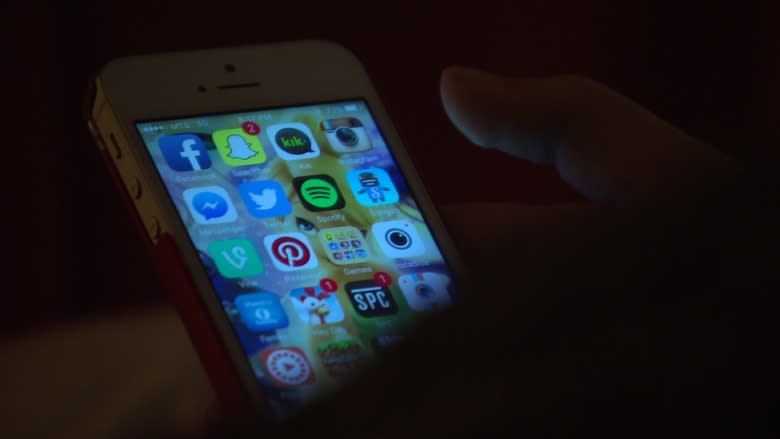Bullied Manitoba teen told to watch video of B.C. teen Amanda Todd who killed herself
Court documents of messages between a Manitoba teen and others in a group messaging app suggest she was told to look at the video made by B.C. teen Amanda Todd who killed herself in 2012 after enduring sexual extortion online.
Transcripts of the messages suggest the Manitoba girl could "learn" from Amanda Todd's experience.
Todd's mother, Carol, said she's sad to hear that her daughter's video, and death, were brought up in connection with the Manitoba cyberbullying case.
"What they did was wrong and they are using Amanda's story to make it acceptable. To validate what they did. But it's not OK," Carol Todd said.
It's unclear exactly what the people messaging the Manitoba teen meant, because other exchanges seem to show they were trying to warn the girl of the danger of sharing photos online, even as other posts asked her to send nude pictures online.
Cyberbullies 'repeated history'
Todd says the exchanges might show that the Manitoba cyberbullies may have been aware of the damage that online harassment does and acknowledged it, but that didn't stop them.
"They knew about Amanda's video and they did it anyway. They repeated history."
Todd says that the legacy of Amanda`s video is to show how damaging these kinds of actions can be. She doesn't want to see the lesson manipulated or distorted.
Todd says more education and supports are needed to help young people who are potential victims of cyberbullying.
It's something the mother of the Manitoba teen echoes, that there aren't enough supports in place to deal with the lasting effects of being victimized.
"It has been a struggle to even find proper support. Even finding a proper therapist that can deal with internet crimes," said the Manitoba mother.
"There are so many kids that this is affecting but Canada is still really behind the times. …'Cause maybe there wouldn't be so many children ending their lives if they actually knew they had somewhere where they could go talk to [someone] and be in a safe place to do it," she said.
Her daughter, who was 14 at the time, said that she understands the feelings of fear and embarrassment that come from being victimized, but says kids need to understand that there is a way out.
"It's really nerve-wracking to go up … and tell someone [that you've been victimized] but honestly, when you tell them it feels like something has just lifted off of you and that somebody finally knows," she said.
Support for victims of 'technology crimes'
"We have advocacy centres for kids who have been abused, and we have advocacy centres for women who have been abused in domestic violence," Carol Todd said. "We need to see advocacy for victims of technology crimes, such as [help dealing with] the images that have come out, or the cyber abuse that comes out … because that victimization is as terrorizing as physical abuse."
Todd says that the conversation begins with speaking to children about what is appropriate behavior online, but it doesn't end there.
"It's about digital responsibility and digital citizenship. We need to be able to teach that within our family structure and within our school structure a lot more. And that would teach individuals about what is right and what is wrong," said Todd.



